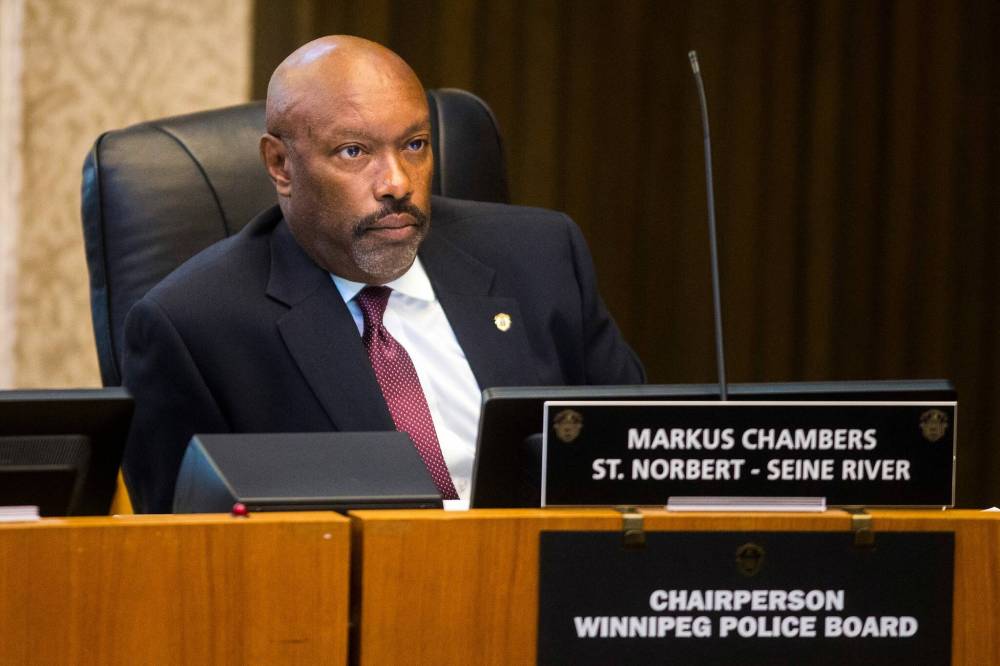City seeking public input on police funding model
Advertisement
Read this article for free:
or
Already have an account? Log in here »
To continue reading, please subscribe:
Monthly Digital Subscription
$0 for the first 4 weeks*
- Enjoy unlimited reading on winnipegfreepress.com
- Read the E-Edition, our digital replica newspaper
- Access News Break, our award-winning app
- Play interactive puzzles
*No charge for 4 weeks then price increases to the regular rate of $19.00 plus GST every four weeks. Offer available to new and qualified returning subscribers only. Cancel any time.
Monthly Digital Subscription
$4.75/week*
- Enjoy unlimited reading on winnipegfreepress.com
- Read the E-Edition, our digital replica newspaper
- Access News Break, our award-winning app
- Play interactive puzzles
*Billed as $19 plus GST every four weeks. Cancel any time.
To continue reading, please subscribe:
Add Free Press access to your Brandon Sun subscription for only an additional
$1 for the first 4 weeks*
*Your next subscription payment will increase by $1.00 and you will be charged $16.99 plus GST for four weeks. After four weeks, your payment will increase to $23.99 plus GST every four weeks.
Read unlimited articles for free today:
or
Already have an account? Log in here »
Hey there, time traveller!
This article was published 05/01/2022 (1420 days ago), so information in it may no longer be current.
The city is examining different ways to cover the increasing budget of the Winnipeg Police Service, which critics argue should be heavily defunded.
On Wednesday, city officials invited the public to weigh in on options to keep the status quo funding formula or select one of four new options, which include a new potential public-safety levy.
St. Norbert-Seine River city councillor and Winnipeg Police Board leader Markus Chambers said council must ensure the budget provides enough resources to maintain police service levels at the same time that the number of calls to 911 is increasing.

“It’s a matter of looking at what the standards of service (are) that Winnipeggers expect,” he said.
In recent years, councillors have heard repeated requests from activists to reduce the police budget and spend more money on libraries, recreation centres and other community services instead. But Chambers said many citizens have called on elected officials to maintain the police budget in order to protect public safety.
“The only way that we can reduce the police service in that (defunding) sense is (an officer) complement reduction… (Since) our resources are already thinly stretched, then it results in less service being provided to the citizens,” he said.
The five funding models being considered include:
• Maintaining the current WPS budgeting process.
• Automatically increasing the budget each year to include an inflation increase (which would have added $413,000 to the $301.1-million WPS operating budget for 2021)
• Increasing the budget each year by the cost of wage increases plus inflation on all other costs (which would have added $672,000 in 2021)
• Guaranteeing the same wage and inflation hikes, but funding them through a public-safety levy (which would have covered an extra $672,000 in 2021)
• Capping the annual budget increase to a set portion of new property-tax revenues (which would have reduced the 2021 budget by $5.6 million).
Winnipeg Police Service declined comment on the funding models Wednesday, referring questions to Chambers.
Chambers and Coun. Scott Gillingham, who heads the city’s finance committee, said they’ll wait for public feedback before deciding which model they would support.
Given recent calls to defund the police, Gillingham expects there could be opposition to a new tax devoted to the department budget. But he stressed re-examining police funding should ultimately help control the rate of annual funding increases.
“Police services must be sustainable and affordable for the people of Winnipeg,” he said.
A community services advocate who has repeatedly lobbied the city to divert funding from police to community services said none of the potential funding formulas would achieve that goal.
“There needs to be more, and not less, public input into city spending and, overall, less funding for the police,” said Bronwyn Dobchuk-Land, who teaches criminal justice at the University of Winnipeg. “All of these models kind of set us up for less public input and more funding for the police.”
For example, if council accepts a funding formula that promises an annual increase to cover inflation and/or wage hikes, that would make it less likely for public debate to shape each year’s financial plan, said Dobchuk-Land.
While the property-tax share option would have resulted in less funding in 2021, city officials confirmed that wouldn’t be a guaranteed outcome every year, since it’s tied to fluctuating tax revenues.
Chambers stressed no funding formula will be adopted without community input. And, if any changes are approved, he said Winnipeggers will still be able to share their views at annual budget meetings.
To weigh in on police funding, Winnipeggers can visit winnipeg.ca/policefundingmodel.
The public consultations will include a survey, as well as telephone town halls and online presentations.
Joyanne.pursaga@freepress.mb.ca
Twitter: @joyanne_pursaga
Police funding model presentation

Joyanne is city hall reporter for the Winnipeg Free Press. A reporter since 2004, she began covering politics exclusively in 2012, writing on city hall and the Manitoba Legislature for the Winnipeg Sun before joining the Free Press in early 2020. Read more about Joyanne.
Every piece of reporting Joyanne produces is reviewed by an editing team before it is posted online or published in print — part of the Free Press‘s tradition, since 1872, of producing reliable independent journalism. Read more about Free Press’s history and mandate, and learn how our newsroom operates.
Our newsroom depends on a growing audience of readers to power our journalism. If you are not a paid reader, please consider becoming a subscriber.
Our newsroom depends on its audience of readers to power our journalism. Thank you for your support.
History
Updated on Wednesday, January 5, 2022 7:40 PM CST: changes word


